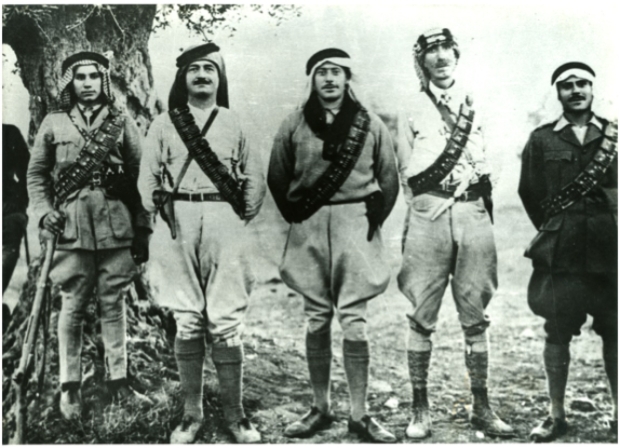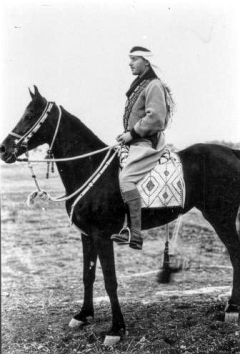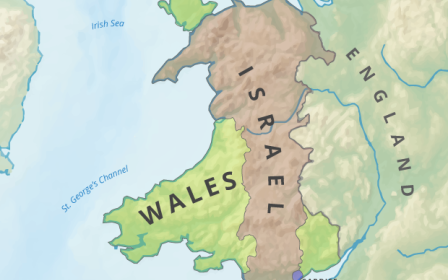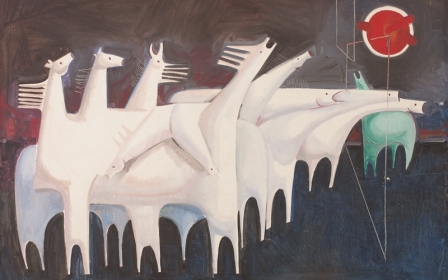Fawzi al-Qawuqji: Relentless Arab fighter who tried to change Middle East
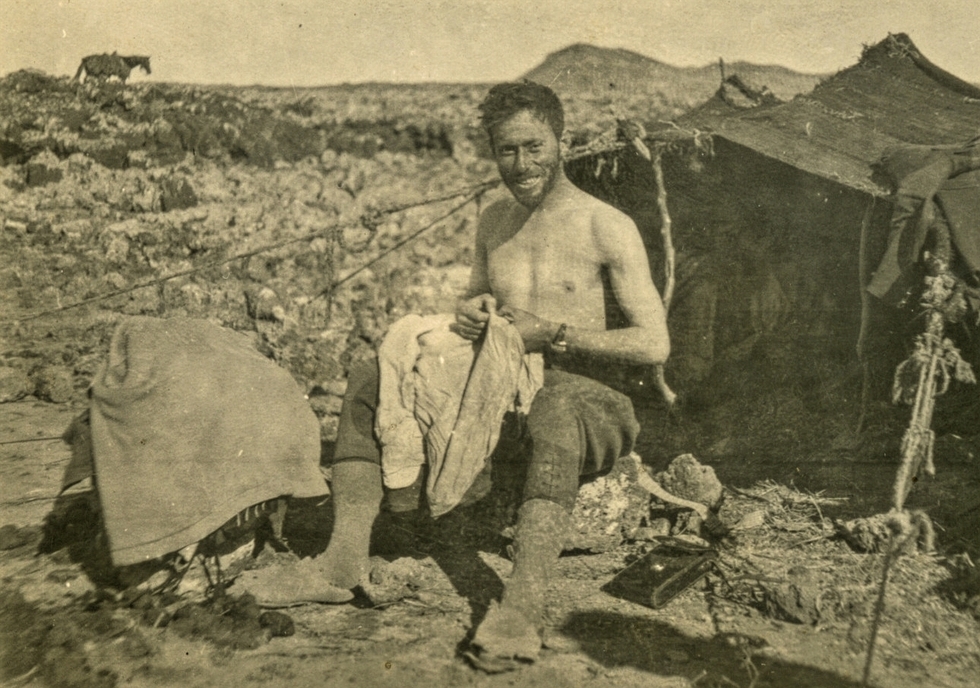
Fawzi al-Qawuqji was supposed to have a promising future as a military man in the ranks of the Ottoman army.
Born in the Lebanese city of Tripoli in 1890, he trained to become an army officer at the War College in Istanbul, then fought during the First World War on the Iraqi and Palestinian fronts against the British forces.
But his career came to a halt with the subsequent collapse of the Ottoman army and the retreat to Anatolia. In the coming years, the young officer turned insurgent. He led the Syrian Revolt in 1925 against the French troops - despite accepting a military role at the Syrian Legion, a new army created by the French mandate.
In 1936, he led Palestinian soldiers against British troops. And in 1948 he famously led the Arab Liberation Army in the Arab-Israeli war of 1948.
His life was paradoxical and complex as he roved between Palestine, Lebanon, Syria, Iraq and the Hijaz, railing against the colonial borders drawn by Sykes and Picot in 1916 and longing for that Ottoman cosmopolitanism that he had experienced as a trainee officer in Istanbul.
To his supporters he was a hero, an insurgent and an Arab nationalist. To his opponents he was an opportunist, a defeated leader, even a British spy.
Writer Laila Parsons mines this rich seam of material for The Commander: Fawzi al-Qawuqji and the Fight for Arab Independence 1914-1948 (Saqi Books, 2016), an exciting study of the life of Qawuqji and his comrades.
The book has been shortlisted for the Palestine Book Awards 2017 organised by Middle East Monitor, due to be announced in London on 24 November. Parsons spoke to Middle East Eye to explain what drove her to tell Fawzi al-Qawuqji's story.
Middle East Eye: The Commander is written as a historical narrative. When I read it, I was expecting an academic book. Why did you choose to write it this way?
Laila Parsons: It was a conscious choice to write it as a narrative history. I'm an academic and I've been teaching Middle East history in North America. I taught first at Yale and I have been teaching at McGill University for 13 years.
I think that we have a relative lack of narrative histories of the Middle East in English to assign in the classroom. And one of the reasons for that is that ever since Edward Said published Orientalism, which I thought was a crucial intervention in the field, most academic historians began following him to write critical histories of colonialism in the region.
'We have a lot of books that are still using the colonial archive to critique colonialism and orientalism, but still talking about colonialism'
But it means that we have a lot of books which are still using the colonial archive to critique colonialism and orientalism - but still talking about colonialism. There was a gap created, where we just don't have many well-researched narrative histories in English that take the people of the region as the protagonists, driving the action with complex context and complex lives and difficult choices to make.
So I really wanted to write a narrative history that was deeply researched. I wanted to make it based on Arabic sources, not on colonial sources. I obviously had access to Qawuqji’s archive, which made this an easier task.
The book can also be read by a mainstream audience as an exciting story that opens up the world of anti-colonial resistance from the point of view of Arab fighters in the period between 1914 and 1948.
MEE: How did you deal with the formal and informal archives when it came to writing this book?
LP: The question of archives is absolutely crucial. There are a lot of people out there who work on the history of the Arab-Israeli conflict, who claim that there are no Arab archives. Hence they write from the point of view of the Israeli and the British archives because they claim there are no Arab archives.
It's true that access to Arab state archives is difficult. Of course there's no Palestinian state archive because there isn't a Palestinian state. It's also impossible to get into the military material in the Egyptian archive for the period of the 1948 war, for example.
I think a lot of people use this as an excuse to just rely on the Israeli and the British archives, and then the story gets really distorted, because the archive underpins the narrative. And so you get these distorted stories about 1948 or other parts of the Arab-Israeli conflict.
I also used a lot of published memoirs in Arabic by military leaders. These are also under-studied and under-read, the memoirs of people like Taha Al-Hashimi, Munir Al-Rayyes and Said Al-‘Aas, who was a rebel fighter. A lot of these memoirs were published in the 1970s, and they are good primary sources.
So I tried to use Arabic sources to tell a story from Arab perspectives. I had written a previous book on 1948 using the Israeli archive about the Druze cooperation with the Israeli army, and I knew exactly how the archive limits what you can say.
MEE: Reading the story of Al-Qawuqji, I had a sense that he kept changing sides. He was an Ottoman soldier, then he joined the French mandate forces, then he instigated a revolt against the French, then he fled to Iraq, then returned to Palestine by 1936.
LP: I don't think I would characterise it as changing sides. I think it's a more a story about a young man who was trained in the Ottoman military school system to have a future as a professional career officer in the Ottoman army. Of course, when he was trained he had no idea that the Ottoman army was going to collapse in 1918. When the Ottoman army collapsed, his whole future was taken away. What was he going to do?
He first joins King Faisal’s army in Syria because he's an Arab nationalist and he believes in the Arab cause. He doesn't want to go north and fight alongside Mustafa Kamal’s forces in Anatolia, like many Arab officers who had fought for the Ottomans did at that time.
I don't really think of him as changing sides. It's rather that he becomes like many other Arab officers who served in the Ottoman army. He becomes a kind of roving rebel against colonial forces. He goes wherever the fight is. He also doesn't believe in the colonial borders that have been set up under the mandate system. He moves through the land as if those borders didn't exist.
So he's fighting for Arab nationalism and what he thought of as a Greater Syria. And he's fighting against colonial forces, whether that's in Iraq or Palestine or Syria or regrouping in the Hijaz with Ibn Saud, one of the only Arab leaders who was not under the control of a colonial army.
He was not grounded within a state structure. He doesn't become a part of the Iraqi army or the Syrian army. He becomes a part of this mobile group of ex-Ottoman Arab officers who simply couldn't accept the post-war dispensation.
MEE: History remembers Al-Qawuqji in two different ways: one as a hero when he was fighting the British and French mandates; and one as a defeated commander after the Nakba or catastrophe in 1948. How has Qawuqji’s importance changed - and why?
LP: His reputation changed after 1948 in the Arab world, because he's associated with the failure of 1948 and with the Nakba. He made some serious strategic mistakes in 1948, but he wasn't the only one to make those mistakes. He gets picked out in particular for blame, partly because he doesn't have a place in high political circles in the post-1948 world.
Many of the men who fought in 1948 go on to become government ministers and so on, but Qawuqji doesn't. So he's easy to target. His reputation changes and he's accused of many things, including being a collaborator and betraying the Palestinians in 1948.
Yes, he made mistakes but the context in which he was operating was an incredibly challenging context. Anyone who was going to step into that role was probably going to end up being associated with failure. The odds were really against him. He had very few resources. The Arab League was disorganised, and not able to resupply him.
I really don't believe that he deserves the kind of demonisation that he's been subjected to. That whole generation in a way has been subjected to such attacks. And I think it's a more complicated story. I think it's a very mixed story of effort and planning and struggle and yes, also mistakes.
The Arab defeat in 1948 was the result of some bad decisions combined with the overwhelming force of the Israeli army on the ground and international support for the Jewish state, which had been built into the structure of the mandate of Palestine since the Balfour Declaration. The Jewish national home had always been supported by the British as part of their imperial project.
Qawuqji was fighting a very difficult anti-colonial war and the 1948 war was the last war in that anti-colonial struggle. My book takes the 1948 war out of the context of history of the Arab-Israeli conflict and puts it in the context of the history of colonialism and the struggle against colonialism. But the Arabs were really disadvantaged in that struggle.
MEE: You dedicate a chapter of The Commander to the story of Qawuqji in Berlin from 1941 till 1947. This period has attracted lots of attention from “amateur historians” as you describe them. How challenging was it for you to write about this controversial period?
LP: It was a challenging part of the book to write because I knew there would be a lot of interest in how I handled it. The reason there's been so much focus on the Arab nationalists in Berlin during that period is because people on the Israeli right have long used the fact that Arab nationalists were in Berlin during the Second World War to discredit the Palestinian and the Arab nationalist cause as originating from anti-Semitism and the ideology of Nazism.
There were Arab nationalists in Berlin during the war, just as there were Indian nationalists and Irish nationalists. They were mainly there for anti-colonial reasons because the Germans were against the British and the French who had colonised the Middle East and they believed that a German victory in the war would bring them independence from colonial rule. That's the reason why they were in Berlin. It was nothing to do with the goals of National Socialism and with the ideology of National Socialism.
'He didn't go to Germany because he was ideologically committed to the Final Solution. He went to Germany because he was being hounded by the British after his role in the 1936-39 anti-British revolt in Palestine'
I tried to show that context in the book, although it is also true that some of the Arab nationalists in Berlin, such as Hajj Amin Al-Husayni, the most prominent, did get swept up in the ideology of National Socialism and made mistakes that have been really bad for the Palestinian cause. And I face that head-on in the book.
But it's not the reason Hajj Amin was there. He didn't go to Germany because he was ideologically committed to the Final Solution. He went to Germany because he was being hounded by the British after his role in the 1936-39 anti-British revolt in Palestine. Like Qawuqji, he fled the Middle East for Germany in 1941 after the British crushed the pro-Axis coup in Iraq.
And it is also true that before the Second World War, many of the Arab nationalists did have ties to the German foreign office and German intelligence in the Middle East, which had been seeking Arab support in their pre-war competition with Britain and France. Again, Arab nationalists forged these links with Germany because the Germans were promising to give the Arabs help in their struggle against British and French colonialism.
There is also a longer historical story of ties with German officials that goes all the way back to the First World War, long before Hitler and Nazism, when Qawuqji was working very closely with imperial German officers seconded to the Ottoman army in the First World War.
In the book I tried to show all these contexts so that the reader can get a deeper understanding of why some Arab nationalists ended up in Berlin during the Second World War.
Middle East Eye propose une couverture et une analyse indépendantes et incomparables du Moyen-Orient, de l’Afrique du Nord et d’autres régions du monde. Pour en savoir plus sur la reprise de ce contenu et les frais qui s’appliquent, veuillez remplir ce formulaire [en anglais]. Pour en savoir plus sur MEE, cliquez ici [en anglais].


